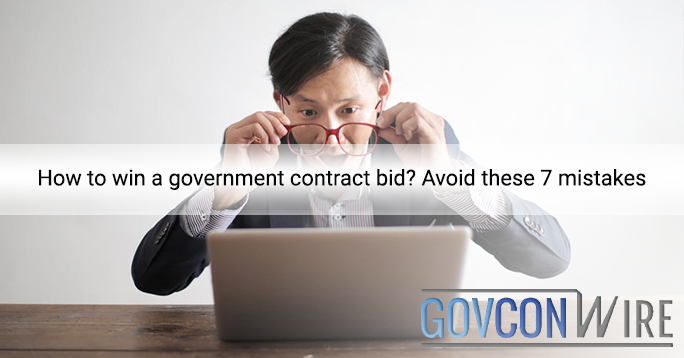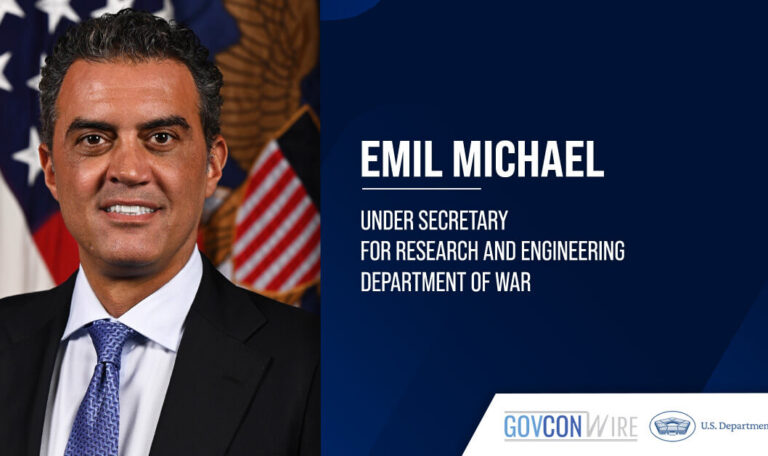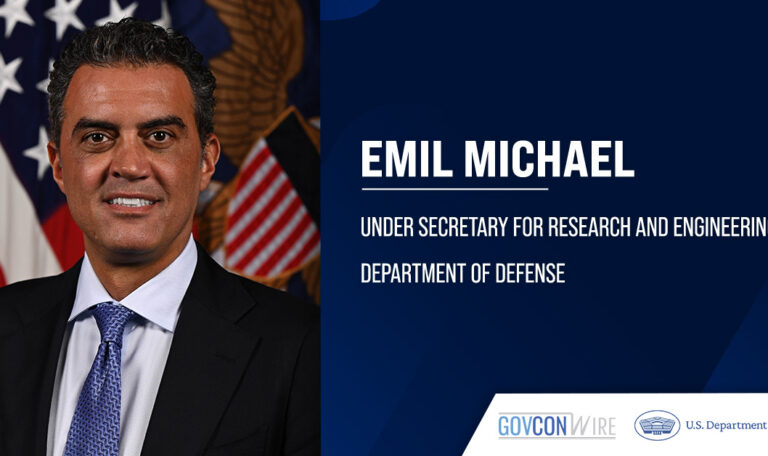The government contracting industry offers one of the best growth opportunities, whether you run a small business or a large enterprise. Each year, the federal government mobilizes its GovCon community to assist it in bolstering the U.S.’ different key sectors. Over $600 billion worth of federal government contracts were awarded to support the nation’s recovery from the COVID-19 pandemic.
So how can you start staking your claim into this lucrative market opportunity? You send a clear, compelling and professionally-made federal government contract proposal.

7 Mistakes to Avoid if You’re Writing a Government Contract Bid Proposal
In the spirit of transparency, the federal government has implemented a strict process for contractors. However, before you win government contracts, a contracting officer will thoroughly review your past performance, business profile, and more to determine your capability for successfully performing on a contract.
The first step in proving your competency is submitting a flawless contract bid. Crafting a proposal for federal contracts can be overwhelming, so here are some of the most common mistakes that you should avoid when writing your proposal:
1. You Bid on Every Government Contract Available
If you are a small business owner who wants to enter the GovCon industry, submitting as many contract proposals as possible to secure your win seems like a viable option. But it’s not!
When submitting a contract bid, you say that you can confidently deliver the requested task. Your proposal should reflect your competence and willingness to commit to excellence. Anything less than what you have promised will only tarnish your reputation thus, killing any chance to win government contracts in the future.
Submitting contract proposals to projects you are underqualified for is like shooting yourself in the foot. Even if you step out of your comfort zone by bidding on a project that is different from what you usually do, you should still find a way to play to your strengths. Winning government contracts isn’t about sending contract proposals to all government buyers. Instead of wasting your precious resources, you should learn how to pick the best federal contract to bid on. Try to search for bidding opportunities that require your expertise!
2. You Underestimate Your Competition
Like other types of competition, you should never underestimate your competitor’s abilities, especially in the GovCon industry. The trust and connections of reputed contractors with federal government agencies may run deeper than you believe.
Your lack of knowledge about them may spell your downfall in the bidding, which is why you should pay more attention to market research before you start writing your contract proposal. For example, if you are a small business owner, you can use the Dynamic Small Business Search, or DSBS, tool to your advantage. Managed by the U.S Small Business Administration, this will let you see the profile of all registered small businesses.
Additionally, the DSBS enables you to review your competitors’ past government contracts. This will help you gauge the quality of the business relationship between your competitors and their government agency customers based on their past performance. From there, you can begin formulating a plan on how to position yourself more favorably than your competitors.
3. You Only Skim the Request for Proposal
The request for proposal, or RFP, is an essential document that a federal agency releases to solicit business proposals for a specific project. The RFP contains all the technical requirements, from the project details to proposal formatting.
However, the document can, at times, be pretty lengthy. But as the first step in the proposal process, you have to be patient in comprehending the information stated in the paper. If you just skim through the RFP, chances are you’ll overlook something. No matter how small of detail it may seem, it can either make or break your proposal.
The government receives countless contract bids for their different projects. If it saw that your proposal didn’t follow its strict instructions, it wouldn’t think twice about tossing your proposal into the rejected pile. If you find it challenging to review the RFP, try bringing in a dedicated proposal team to help you out.
4. Your Proposal Document Is Inconsistently Formatted
This error, which is most likely borne from neglecting to do due diligence in thoroughly reviewing the RFP document, can result in your instant rejection.
Submitting an inconsistently formatted bid not only suggests that you ignored the RFP provided by the agency, but also it shows that you are incapable of following instructions. It is undeniable that you will feel anxious while writing your proposal, but it’s not an excuse to commit such mistakes.
One of the secrets in creating an impeccable proposal is reviewing the document over and over until it’s perfect. It would also be best to have a trusted set of eyes to check whether your proposal is up to standards.
5. Your Proposal Is Unspecific in Addressing the Agency’s Needs
When the procurement officers read your proposal, they want to see a specific plan on how you intend to fulfill the contract requirements. If your plan of action is too vague, they will think you don’t have what it takes to deliver the task.
So when you start writing your contract proposal, you should aim to leave an excellent lasting impression on the agency—you can do that by laying out your clear strategy.
With countless other government contractors vying for the award, your proposal should stand out from the crowd. But you don’t have to do all sorts of gimmicks to grab the attention of the federal agency. Instead, structure your bid in a way that emphasizes how your proposed solutions are clear, concise and actionable.
6. You’re Bidding Too High or Too Low
Knowing how to price your goods and services right is an essential skill in this line of trade.
If you bid too high, it’s pretty much guaranteed that the government agency will ignore your proposal since your proposal value exceeded their budget. However, pricing your proposal too low is not a sound strategy either. The agency will deem your proposal too risky and unrealistic since they have no guarantees of the quality of ludicrously cheap goods and services.
The government agency aims to hire a contractor who can deliver quality service at a reasonable price. To help you know the optimal pricing range, you can look at similar contracts previously awarded at usaspending.gov.
To put it simply: perform market research to determine the proper price range of a contract. Then think of a competitive contract value that is high enough to ensure profits and quality operations, but still low enough that you are within the federal agency’s preferred spending range.
7. You Didn’t Ask Questions
Never be afraid of asking questions. Asking for further details and clarifications ensures that the content of your proposal aligns with the expectations of the requesting federal agency. Learning to ask the right questions brings you a step closer to success.

Where Can You View Federal Business Opportunities?
Still can’t find the perfect government opportunities to bid for? We have you covered!
Different government agencies publish federal contracting opportunities on their respective websites, so look for the government agencies that best align with your expertise. Additionally, an online Contracting Opportunities Forecast Tool is also available where upcoming contracts are posted in advance so you can plan your winning business strategy ahead of time.
If you want to broaden your scope in your search for government contracts, there are also numerous online platforms that government agencies use to find contractors for their projects. Here are some of the most useful websites you should keep tabs on:
1. SubNet
Also known as the Subcontracting Network, SubNet is an online federal contracting platform managed by the U.S. Small Business Administration. At SubNet, businesses, especially officially-recognized small businesses, can look up subcontracting opportunities.
Large contracts usually awarded to big companies often include subcontracting plans. These companies who act as prime contractors seek small business contractors to help them fulfill the government requirements listed in the contract. In this scenario, prime contractors give qualified small and disadvantaged businesses preferential consideration.
Subcontracting is an excellent opportunity to make a name for yourself in the industry, especially if your small business is just starting out. Although you work under a prime contractor, rather than the federal agency itself, you can still put your subcontracting performance in your portfolio to boost credibility.
2. Contract Opportunities by SAM.gov
Formerly known as FedBizOpps, Contract Opportunities is now a service offered at the System for Award Management, or SAM.gov, website, where government contractors can browse for their next federal contract deal.
The types of contract opportunities you can expect are: pre-solicitation notices, solicitation notices, award notices and even sole-source notices. Additionally, there are specific contracts called set-asides posted here on the website. Set-asides are contracts reserved for business owners with a disadvantaged socio-economic status.
To know which type of contract is best for a small business owner like you, check out this article.
3. GSA’s Schedule Contract
A GSA Schedule contract is probably the easiest government contract to win. The Schedule, also known as the Multiple Award Schedule, or MAS, is a long-term government-wide contract that connects different federal agencies to government contractors who sell goods and services.
To learn how to sell to the government with a Schedule contract, check out GSA’s guide. Additionally, GSA has also dedicated valuable learning resources to small businesses that want to sell the government. Check it out here.
How Can You Register as a Government Contractor?
Signing up as an official contractor can be overwhelming and tedious. So before you start sending out your contract proposals, make sure that you have covered all the bases first! Check out this quick overview of what you need to do to become one:
1. Decide on a Business Name
Once you have decided what to name your business, you should register it legally. There are different ways to register your business name depending on the size of your business. Learn more about it here.
2. Apply for your Federal Tax ID number
Your Federal Tax ID number functions similarly to your Social Security Number. Without your Federal Tax ID, your company will be unable to apply for business licenses and permits, nor even legally open a bank account to which your payments as a federal government contractor will be wired. You can easily apply for your tax ID here.
3. Request Your DUNS Number
You will need your DUNS number for pretty much everything. To request your unique 9-digit code, file an application at the Dun & Bradstreet website for free.
4. Select Which NAICS Code Fits Your Business
The NAICS code is the nation’s standard for classifying different business types in every industry. You don’t have to undergo a process to get your NAICS code. Just enter at this U.S. Census website the nature of your business, products and services to see the NAICS codes assigned for each.
5. Register at SAM.gov
Officially registering your small business at SAM.gov allows you to start bidding on government contracts! Make sure that you don’t overlook this to avoid problems in the future.
6. Complete Your SBA Profile
Most government contractors miss this critical step. You should fill out your SBA profile after registering your business at the SAM.gov portal.
Completing your SBA profile is necessary to add your business into the DSBS. This will boost your visibility to federal contracting officers scouting for contractors.
This mostly sums up the government contractor registration process. But if you still feel a little bit lost, here is a comprehensive beginner’s guide that will walk you through the journey.














